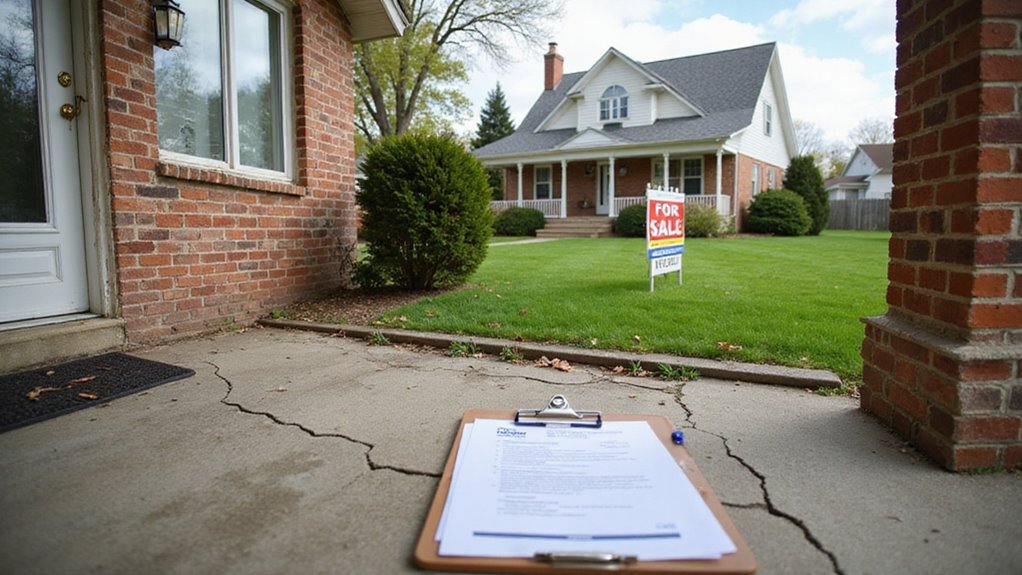Selling a house with foundation damage is much harder than a traditional home sale. Cracks in the foundation can scare buyers away. Repair costs and uncertainty make the process even more stressful.
You may face lower offers and tougher negotiations than you expect. Banks might not lend money to buyers until repairs are made. Legal issues and disclosure requirements can make the sale feel overwhelming and risky.
Selling a house with foundation damage is more complex, costly, and time-consuming than selling a home in good condition. But you can protect yourself and get the best outcome by knowing how foundation issues change the sale process.
This guide offers clear steps to move forward with confidence. This blog will help you understand your options and avoid common mistakes when selling a home with foundation damage.
Key Takeaways
- Homes with foundation damage typically sell for 10-20% less than similar homes in good condition.
- Traditional buyers and lenders often reject homes with foundation issues, limiting the buyer pool mostly to investors and cash buyers.
- Selling with foundation problems usually requires longer timelines due to extra inspections, repair quotes, and negotiations.
- Sellers must fully disclose all foundation issues and repairs, increasing legal risks compared to traditional sales.
- Repairing foundation damage before selling attracts more buyers and higher offers, but involves significant upfront cost and time.
Understanding Foundation Damage and Its Implications

Foundation damage can affect your home’s safety and value. Homeowners should know what causes damage and what it means before selling. If the foundation is damaged, it may be harder to sell your house.
Soil stability is important for keeping a foundation strong. Clay soil, too much water, or bad drainage can make the soil move. Moving soil can cause cracks or uneven floors in your home.
The type of foundation material also matters. Concrete slabs, pier and beam, or masonry foundations react differently to soil changes. If the soil shifts, even strong materials may start to fail.
Visible signs of damage include cracks, doors that stick, or sloping floors. If you spot these problems, you should find out what caused them. Knowing the cause helps you explain the issue to buyers and contractors.
Understanding the extent of foundation issues is crucial for determining the best course of action and accurately communicating with potential buyers.
How Foundation Issues Affect Home Value
Foundation issues lower your home’s value. Buyers worry about repair costs and possible future problems. Lenders may also hesitate to approve loans for these homes.
Appraisers often reduce a home’s value when they see foundation damage. Even small cracks can lead to a lower price. If the problem is not fixed, your home could lose 10% to 20% of its value.
If you disclose the repair cost early, you can set a fair price. This helps you understand your bottom line. Proper disclosure also makes negotiations with buyers easier.
Additionally, understanding the tax implications of selling a home with foundation damage can help you plan your next steps more effectively. Being aware of title issues related to foundation claims, such as liens or legal restrictions, can prevent delays or complications during the sale process.
Buyer Perceptions and Concerns

When you put a house with foundation damage on the market, expect buyers to approach with skepticism and heightened scrutiny. They’re often concerned about hidden repair costs and long-term stability, which can erode their trust in the transaction. As a result, you’ll likely see lower offer prices to offset these perceived risks.
Additionally, legal and compliance issues, such as liens or code violations, can further complicate the sale and discourage potential buyers. Buyers may also worry about the extent of damage and whether the repair costs will outweigh the home’s value, especially if they are unfamiliar with assessing structural damage.
Trust Issues and Skepticism
Buyers often feel unsure about homes with foundation problems. They may worry about serious issues and doubt what sellers say. This skepticism is stronger than in most home sales.
If you try to sell a house with foundation damage, buyers may question the home’s condition. They often examine inspection reports and seller disclosures very closely. Buyers may look for signs of hidden or bigger problems.
These trust concerns can make negotiations slower and harder. Buyers may ask for more proof or extra explanations. If you want to build trust, you should share clear documents and be honest about the home’s condition.
Fear of Costly Repairs
Buyers worry about the high cost of fixing foundation problems. They often wonder how serious the damage is and what repairs will cost. If foundation issues are present, buyers may expect expensive repairs.
Repairing foundation problems can be complex. Even small cracks may require special contractors and permits. If the damage is worse than it looks, costs can quickly rise.
Uncertainty about hidden damage makes buyers cautious. They may budget extra money for unexpected repairs. This concern can make other good features of the home less important to them.
Impact on Offer Price
Foundation damage usually lowers the offer price on your home. Buyers consider repair costs and possible future problems. They often offer less than they would for a similar home without damage.
If repairs look small, buyers may still expect bigger issues. Many buyers assume the worst and worry about safety or long-term value. They often ask for bigger price cuts than the repair costs alone.
Homes with foundation issues are less competitive in traditional sales. Offers are often much lower than for homes without damage. To get the best sale price, sellers should be honest about issues and set realistic expectations.
Inspection and Disclosure Requirements

You’re required to provide a thorough foundation condition report when listing your home, and skipping this step isn’t an option. Most states mandate full disclosure of any known structural issues, and failing to do so can lead to serious legal consequences. Understanding these requirements protects you from lawsuits and ensures a smoother transaction.
Additionally, knowing the property ownership structure can help clarify who needs to consent to the sale and how assets are managed during the process. Being aware of market dynamics can also influence the timing and strategy for disclosing foundation damage.
Mandatory Foundation Condition Reports
When selling a house with foundation damage, you must provide a foundation condition report. State laws require this report to show any structural problems. The report protects both buyers and sellers from future issues.
A licensed inspector usually checks the foundation. Sellers must share the inspection findings in the disclosure forms. If you hide problems, you could face legal trouble later.
The report should list all foundation repairs and their dates. It must include results from a professional inspection. Sellers also need to mention any unresolved foundation issues, even small ones.
Legal Implications of Non-Disclosure
If you do not disclose known foundation damage or skip needed inspections, you could face legal trouble. Most states require sellers to tell buyers about defects that affect property value or safety. Failure to do this can lead to lawsuits or demands for repairs.
Buyers may sue you for damages, cancel the sale, or ask for expensive repairs. Courts often side with buyers if they find you hid problems. You might also have to pay extra penalties and legal fees.
“Sellers cannot rely on ‘buyer beware’ as a defense because full disclosure is required. If you provide inspection reports and tell buyers about foundation issues, you lower your risk of legal problems. Proper disclosure keeps the sale process smooth and protects you from future disputes.
Financing Challenges for Buyers
Foundation problems make it hard for buyers to get a loan. Lenders see foundation damage as a serious risk. Most buyers will not qualify for a standard mortgage until repairs are done. Foundation issues can prevent buyers from securing a mortgage, as lenders view damaged foundations as a major risk.
Appraisers may lower the home’s value if they see foundation issues. Some may even say the house is unlivable until fixed. These findings usually stop lenders from approving loans. Additionally, title issues can further complicate the sale process, especially if they involve unresolved disputes or encumbrances.
Many government-backed loans have strict property rules. FHA and VA loans often require the home to be in good condition. If the foundation is damaged, buyers may not get these loans.
If you understand these challenges, you can plan better when selling. You may need to prepare for fewer buyers and a longer sale process. Consider fixing the foundation first if you want a smoother sale. Selling to cash buyers offers an alternative that bypasses these financing hurdles.
Negotiating Repairs and Credits
Negotiations usually focus on whether the seller makes repairs or gives the buyer a credit at closing. If the seller offers a warranty on repairs, it can help reassure the buyer. Warranty options show the repairs will last after the sale.
If the seller does the repairs, the sale may be smoother, but delays can happen if repairs take time. Giving the buyer a credit can speed up the sale, but the credit might not cover all repair costs. Some sellers and buyers split the costs, but this might make financing harder.
Accurate repair estimates help set clear expectations for everyone. Disagreements can still happen if people doubt the estimates. Including a warranty may increase buyer confidence, but it can cost the seller more upfront. Properly handling the legal aspects of property transfer, such as understanding probate requirements, can also impact the transaction process.
Careful negotiation can help both parties reach a fair agreement. Clear communication and honest estimates make the process easier. The right approach can lead to a successful sale for everyone. Utilizing cost-effective selling strategies can also help sellers mitigate expenses and facilitate smoother negotiations.
Working With Real Estate Agents
When you work with a real estate agent, you’re required to disclose any known foundation damage to comply with state and local regulations. Agents also face unique negotiation challenges since structural issues can impact both price and buyer confidence. Rely on your agent’s expertise to navigate disclosures and advocate for your best interests throughout the process.
Additionally, understanding property liens and their implications can help you better prepare for potential hurdles during the sale. Working with cash buyers can sometimes simplify these issues, as they often purchase properties in as-is condition with fewer contingencies.
Agent Disclosure Requirements
Real estate agents must follow strict rules about telling buyers about foundation problems. Agents must inform buyers about any known damage or issues. These rules help buyers understand what they are purchasing.
Agents need to share results from recent home inspections. They must also provide any estimates or receipts for repairs. If you ask, they should show you related documents.
If an agent does not disclose foundation problems, there can be serious consequences. This could include lawsuits or the sale being canceled. Full disclosure helps everyone avoid legal trouble.
Proper disclosure can help build trust between buyers and agents. It also makes the selling process smoother for everyone involved. If you have questions, ask your agent for clear answers.
Negotiation Challenges Faced
Negotiating a sale with foundation damage is difficult. Buyers look more closely at the property’s value and possible repair costs. Foundation issues usually give buyers more power in negotiations.
Real estate agents must justify your asking price. They use repair estimates and recent sales of similar homes as evidence. If buyers see any uncertainty, they may ask for more discounts or repair credits.
Sellers should prepare reports from licensed contractors. Accurate documents can help defend your price if buyers push for concessions. Staying transparent and providing clear data can build trust in the process.
Attracting Investors and Cash Buyers
Investors focus on what the property could be worth after repairs. They will review any reports or repair estimates you provide. If you are transparent, they may trust your information more. Offering a clear title status helps investors assess the risks and plan their investments accordingly.
Cash buyers can purchase quickly but usually offer less money. They calculate the cost of repairs before making an offer. If you highlight the investment benefits, you may get more interest. You should gather documents on the home’s condition and possible repairs. If you market the property as a good investment, you will reach the right buyers. Be honest and show how the property can gain value after repairs.
To appeal to cash buyers and investors, it is also important to understand the market value of the property and ensure your pricing aligns with current trends.
Impact on Time to Close
Selling a house with foundation damage usually takes longer to close than a normal sale. Buyers often request extra inspections and repair quotes. These steps can delay the process.
Investors and cash buyers may move faster, but they still check repair costs. Home staging can show the home’s potential but does not solve structural concerns. Most regular buyers hesitate or back out after inspections.
If you sell a house with these issues, expect longer listing times. Closing might take more than the typical 30-45 days. You should allow extra time for due diligence and set realistic expectations.
Legal Considerations and Liabilities
You must fully understand your obligation to disclose known foundation issues to potential buyers, as failure to do so can lead to legal consequences. If you withhold or misrepresent information, you risk lawsuits and significant financial liability after the sale. It’s crucial to comply with both state and local disclosure laws to protect yourself from future disputes.
Disclosure Requirements Explained
Disclosure requirements mean sellers must tell buyers about any foundation problems they know about. Most states make this a legal rule during home sales. If you do not follow these rules, you could face legal and financial trouble.
Sellers should mention all visible foundation issues, like cracks or sloping floors. If you have done repairs, provide copies of invoices and inspection reports. Documentation helps buyers understand the situation.
Each state has different disclosure laws, so check your local rules. If you are unsure, ask a real estate agent or lawyer. Following these steps protects you and builds trust with buyers.
Potential Buyer Lawsuits
Failing to disclose foundation damage can lead to buyer lawsuits. Buyers may sue for misrepresentation or fraud if they find hidden problems later. Courts often side with buyers when important defects are hidden.
Sellers might have to pay for repairs, damages, or even buy back the home. Homeowner insurance usually does not cover these situations. Buyers can claim you caused them financial harm by not telling the truth.
Lawsuits are expensive and take a lot of time, even if you win. Full honesty about foundation issues, with reports and estimates, helps protect you. If you disclose everything upfront, you lower your risk of legal trouble.
Insurance Implications for Sellers and Buyers
Foundation damage can make getting insurance difficult for both sellers and buyers. Most homeowner insurance policies do not cover existing foundation problems. Buyers may have trouble getting coverage or may need to pay higher premiums.
Some homes have structural warranties that might transfer to the new owner. These warranties often have limits and do not replace full insurance. Buyers should check the warranty details before relying on them.
Insurance companies usually want proof of repairs or an engineer’s report before giving a policy. Unfixed foundation issues can slow down or even stop a home sale. Sellers and buyers should address these problems early to avoid delays.
Marketing Strategies for Damaged Properties
You can sell a home with foundation damage by finding the right buyers. Investors, flippers, and renovators may still want these properties. They often see the potential in homes that need repairs.
Staging can help the house look its best. Use simple furniture to make rooms feel bigger and brighter. Highlight good features, like large windows or a big yard.
Always tell buyers about the foundation problem. If you focus on other positives, like location or recent updates, you can attract serious buyers. Good photos and honest descriptions build trust and get more interest.
If you market the home well, you can compete with regular houses. You will appeal to buyers ready for a project. These buyers are often prepared to handle repairs.
Weighing Repair vs. Selling As-Is
Deciding between repairing the foundation or selling as-is depends on your goals and situation. Foundation repairs can raise your property value, but they are often expensive and take time. If you sell as-is, you might close faster and with less effort, but likely for a lower price.
If you repair the foundation, you may attract more traditional buyers. These buyers often expect move-in ready homes and may pay more. However, repairs do not always guarantee you will get all your money back.
Selling as-is is usually quicker and simpler. You may appeal to investors or buyers willing to handle repairs. If your timeline is short, selling as-is could be the better choice.
You should compare repair costs to the potential value increase. Always consider local market trends and buyer expectations before choosing. If you need flexibility or have limited funds, weigh these factors carefully.
Preparing for Post-Sale Obligations
After selling a house with foundation damage, you must know your legal and financial duties. Laws usually require you to tell buyers about any foundation work done or needed. If you do not disclose this, you could face lawsuits or extra costs.
You should check your contract for any promises or repairs that last after the sale. If there are warranties or repair deals, you need to follow them. Keeping all records of past foundation work is important.
Consult a real estate lawyer if you are unsure about your duties. The lawyer can explain your responsibilities and help you follow the rules. If the sale involves escrow for repairs, make sure you understand those terms.
Here is a summary of common duties:
| Obligation | Key Points |
|---|---|
| Disclosure of Damage | Usually required by law |
| Foundation Repair Details | Share reports and repair records |
| Structural Reinforcement Info | Give engineer assessments |
| Escrow/Repair Agreements | Explain terms and responsibilities |
Conclusion
If you need to sell a house with foundation damage, you have several options. You can repair the damage, sell as-is, or market directly to investors. If you sell as-is, you will likely receive a lower offer than for a traditional sale.
If you want a quick and hassle-free experience, consider a cash buyer. We buy houses for cash, including those with foundation problems. This option can help you avoid repairs and long waiting periods.
If you are ready to sell, we at Greg Buys Houses are here to help. We can offer a fair cash price and close when you are ready. Contact us today to get started.

